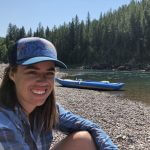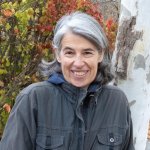Kira Davis
Traverse City, Michigan
Kira Davis grew up in Northwestern Lower Michigan in the quaint town of Petoskey (Bedaasige). Kira is an Odawa woman (Anishnaabekwe) and Tribal citizen of the Grand Traverse Band of Ottawa and Chippewa Indians. Kira has given back to her community by working for Little Traverse Bay Bands of Odawa Indians for 16 years after receiving her Bachelor’s Degree in Environmental Issues and Applications from Michigan State University. The Odawa culture and traditions teaches that it is the responsibility of the Anishnaabekwe to take care of the water. Kira takes this role to heart and has dedicated her personal and professional life to taking care of the water for the next seven generations. Kira took on her new position at Conservation Resource Alliance (CRA), a nonprofit river and wildlife restoration organization, as the Program Director in October of 2015. CRA has been restoring aquatic and terrestrial connectivity by removing dams and improperly sized culverts, improving in-stream habitat, and linking wildlife corridors by restoring terrestrial connectivity for the last 50 years. CRA recognizes by protecting the “veins of Mother Earth” (river systems) we are working towards ensuring the Great Lakes do not reach their tipping point of ecological collapse.”
Kira Davis was recognized as a River Hero at River Rally in 2018.
This interview was conducted by Carly Schmidt on August 27, 2018. Learn more about Kira’s work at the Conservation Resource Alliance.
Did you grow up around water? Where? What are your fondest early memories of rivers, lakes, or streams?
I grew up in Petoskey, Michigan, on the eastern side of Lake Michigan. With inland lakes all around me and Great Lake Michigan three blocks from the home I grew up in. I spent a lot of time visiting the shoreline. Petoskey is named after prehistoric fossils and means “where the sun shines through the clouds” in my native language, Anishnabemowin, language of the Odawa. I have fond memories being four or five and searching for Petoskey stones.
When did you first realize that you wanted to help save rivers or stand up for healthy rivers and/or clean water?
I always gravitated toward water—not just for recreation but for peace of mind and spirituality. During school I had no idea what I wanted to do. After I graduated high school I went to Kauai, Hawaii, and worked on a papaya farm. That’s where I realized that I loved the water. After that I moved to another island, South Padre Island, Texas, for a year. Before I moved back home I traveled through California, up the coast, up through Montana and back to Michigan. That trip brought me to the conclusion that I should be working with water.
I found out later that, in the traditions of my Odawa tribe, women that take care of the water. Once I learned that, I found that this was a completely natural profession for me. And it is less a profession than a part of who I am.
Why is protecting rivers and water important to you now?
It is part of my cultural roots. Water, to me, water is sacred. Everything needs water to survive. I feel like it should be the most vital resource we should all be protecting, especially today.
What does being a part of River Network mean to you?
It was an honor to win the River Hero award [in 2018]. I am humbled at how many people know River Network and see River Network as a well-accomplished nonprofit that helps others collaborate and succeed. People I don’t even know have seen the River Hero award through social media and have reached out to me, broadening my network on a national level. I have never met so many people so passionate about their work. There is such heart in the work River Network does. Being a part of it gives me hope for the future, that we can protect our rivers.
What water-related accomplishment are you most proud of?
I helped work with a tribe and others to create the their first tribally approved Tribal Clean Water Act in Michigan. It took a group of people who were passionate and rooted to water. I don’t have a legal background, but we looked at policy and decided what to incorporate and identified thresholds and criteria to go into the law. It took over 15 years, and we succeeded.
At the moment, I am humbled and proud to now work on the Conservation Resource Alliance Team here in Traverse City and serve 16 watersheds along the eastern side of Lake Michigan. They are so successful in completing on-the-ground restoration for wildlife and aquatic life because they know the value in partnerships and building relationships to work towards common resource goals.
What positive changes would you like to see for water in your community over the next 10 years?
For the Great Lakes Region, I want safe and affordable drinking water for all. I see water as a resource that doesn’t belong to anyone. We have areas in Michigan right now that people don’t have access to clean water. It is a crisis. In Northern Michigan we are fortunate. People travel thousands of miles to enjoy the water, so we have to preserve this pristine water to keep economy balanced but also to make sure the Great Lakes don’t reach their ecological tipping point because all these rivers that we work on feed the Great Lakes.







